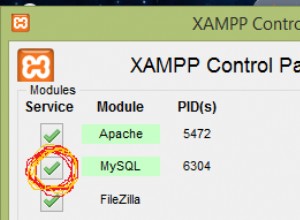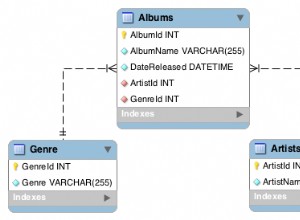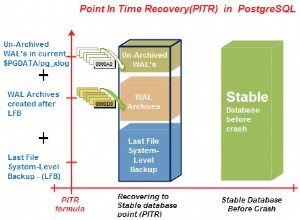कोशिश करें DENSE_RANK रखें
डेटा स्रोत:
CREATE TABLE person
(person_id int primary key, firstname varchar2(4), lastname varchar2(9))
/
INSERT ALL
INTO person (person_id, firstname, lastname)
VALUES (1, 'john', 'lennon')
INTO person (person_id, firstname, lastname)
VALUES (2, 'paul', 'mccartney')
SELECT * FROM dual;
CREATE TABLE address
(person_id int, address_id int primary key, city varchar2(8))
/
INSERT ALL
INTO address (person_id, address_id, city)
VALUES (1, 1, 'new york')
INTO address (person_id, address_id, city)
VALUES (1, 2, 'england')
INTO address (person_id, address_id, city)
VALUES (1, 3, 'japan')
INTO address (person_id, address_id, city)
VALUES (2, 4, 'london')
SELECT * FROM dual;
प्रश्न:
select
p.person_id, p.firstname, p.lastname,
x.recent_city
from person p
left join (
select person_id,
min(city) -- can change this to max(city). will work regardless of min/max
-- important you do this to get the recent: keep(dense_rank last)
keep(dense_rank last order by address_id)
as recent_city
from address
group by person_id
) x on x.person_id = p.person_id
लाइव परीक्षण:https://www.sqlfiddle.com/#!4/7b1c9/ 2
Oracle के KEEP DENSE_RANK विंडोिंग फ़ंक्शन के साथ सभी डेटाबेस में समान कार्यक्षमता नहीं है, आप इसके बजाय सादे विंडोिंग फ़ंक्शन का उपयोग कर सकते हैं:
select
p.person_id, p.firstname, p.lastname,
x.recent_city, x.pick_one_only
from person p
left join (
select
person_id,
row_number() over(partition by person_id order by address_id desc) as pick_one_only,
city as recent_city
from address
) x on x.person_id = p.person_id and x.pick_one_only = 1
लाइव परीक्षण:https://www.sqlfiddle.com/#!4/7b1c9/ 48
या टपल परीक्षण का उपयोग करें, उन डेटाबेस पर काम करेगा जो विंडोिंग फ़ंक्शन का समर्थन नहीं करते हैं:
select
p.person_id, p.firstname, p.lastname,
x.recent_city
from person p
left join (
select
person_id,city as recent_city
from address
where (person_id,address_id) in
(select person_id, max(address_id)
from address
group by person_id)
) x on x.person_id = p.person_id
लाइव परीक्षण:https://www.sqlfiddle.com/#!4/7b1c9/ 21
हालांकि सभी डेटाबेस पिछले कोड की तरह टपल परीक्षण का समर्थन नहीं करते हैं। आप इसके बजाय जॉइन का उपयोग कर सकते हैं:
select
p.person_id, p.firstname, p.lastname,
x.recent_city
from person p
left join (
select
address.person_id,address.city as recent_city
from address
join
(
select person_id, max(address_id) as recent_id
from address
group by person_id
) r
ON address.person_id = r.person_id
AND address.address_id = r.recent_id
) x on x.person_id = p.person_id
लाइव परीक्षण:https://www.sqlfiddle.com/#!4/7b1c9/ 24




